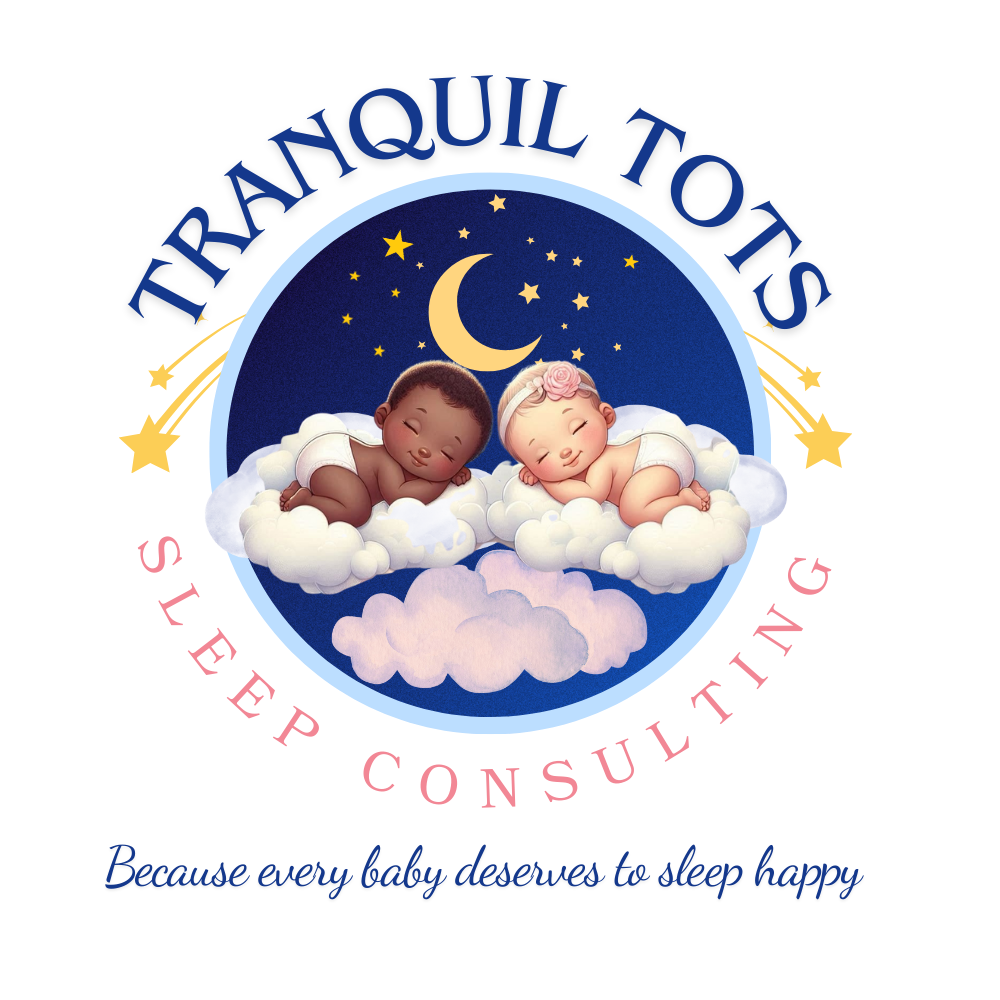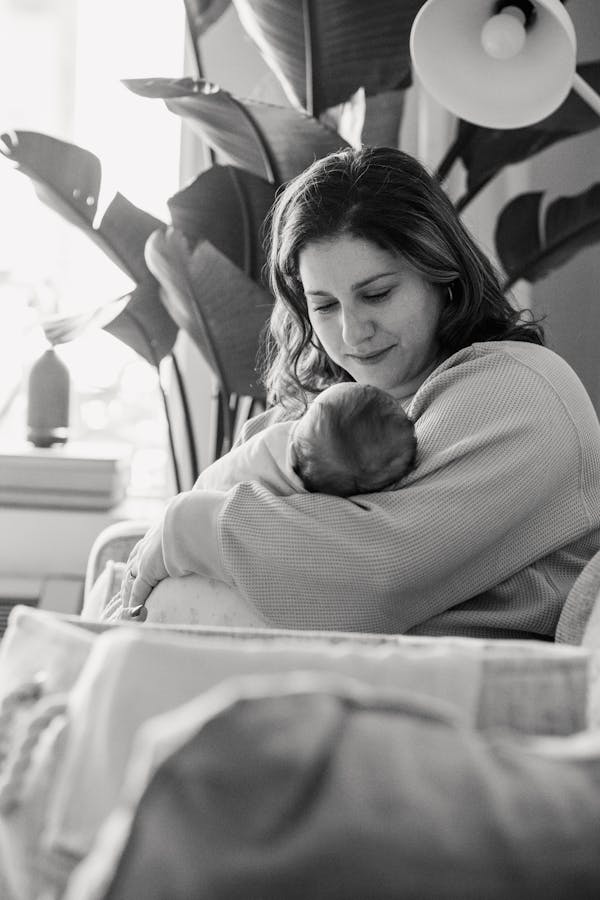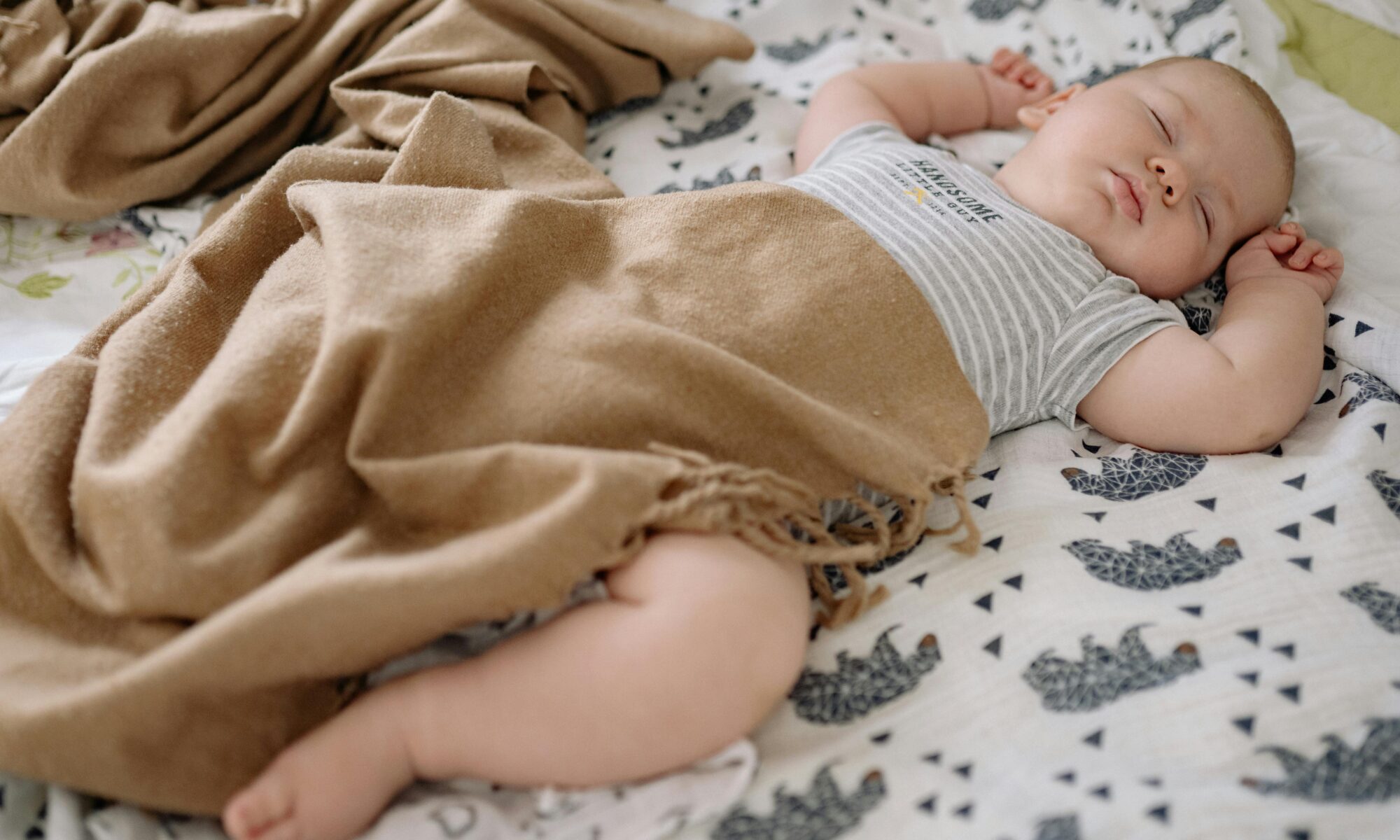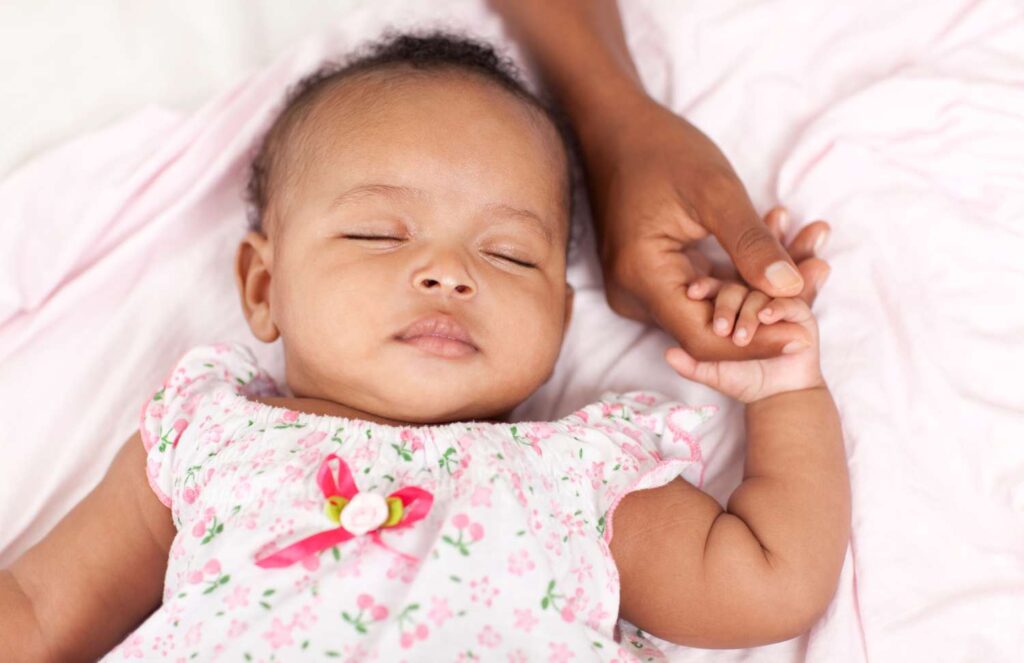When it comes to sleep training, there is no one-size-fits-all solution. Every baby is unique, and so is every family’s approach to nurturing healthy sleep habits. The good news? You have options! Whether you prefer a gentle, gradual approach, or a more structured method, the choice is yours. The key is to select a method that aligns with your family’s comfort level and your baby’s age and temperament.
This blog explores some of the different sleep training methods available and the pros and cons of each method, helping you feel confident and informed as you make the best choice for your family.
I. The Shush-Pat Method
The shush-pat method is a gentle method that combines soothing sounds (shushing) and gentle physical touch (patting) to help baby learn to self-soothe and fall asleep independently. The gentle shushing and patting are done in a rhythmic way to mimic the womb’s comforting environment.
The Pros:
- This method is gentle and nonintrusive, helping soothe babies without leaving them to cry alone. It is a good option for parents who prefer a gentle approach.
- It helps build associations as it teaches babies to associate the shush-pat motion and sound with sleep, which can gradually allow them to settle independently
- Effective for younger babies (typically less than 5 months of age)
- It is customizable in the sense that it can be adapted based on the baby’s preferences, such as patting rhythm or volume of the shushing sounds
The Cons:
- This method can be time-consuming, especially in the early stages of introducing it, as it takes a long time to soothe the baby.
- It can be physically demanding as it requires parents to lean over the crib or hold the baby, which can be tiring, especially during nighttime wakings.
- There is the risk of dependency as some babies may come to rely on the shushing and patting and struggle to self-soothe without it.
- It is limited in usefulness for certain temperaments, as some babies may find patting or shushing stimulating or disruptive, making the method counterproductive.
II. The Pick-up, Put down Method
This gentle method is designed to help babies learn to self-soothe and fall asleep on their own without relying heavily on rocking, feeding, or other external comforting methods. Parents pick up the baby to soothe them when they cry, then put them back down when they are calm. This is repeated as needed. This method works best for parents who are patient and consistent, and for babies who need gentle reassurance rather than prolonged crying to settle.
The pros:
- It’s a gentle approach, making it a good choice for parents who prefer a gentler alternative to cry-it-out methods
- It teaches self-soothing as, over time, babies learn to fall asleep on their own while still feeling supported by their caregiver.
- Parents can respond to their baby’s needs, strengthening the parent-child bond.
- Effective for younger babies (4 – 6 months of age) who may not be ready for more independent sleep training methods.
The Cons:
- It is time–consuming, especially in the beginning, as parents may need to repeat the steps many times in one night.
- It requires patience and can be physically and emotionally exhausting for parents, as frequent pick-ups and put-downs can disrupt their own sleep.
- This method is not suitable for all babies. Some will find the picking up and putting down too overstimulating, making it harder for them to settle.
- Possible sleep associations can form if not implemented consistently, and baby might come to rely on being picked up and put down as a sleep association, which could hinder long-term sleep independence.
III. The Chair-in-Room Method
The chair-in-room method involves gradually moving away from your baby’s crib over several nights, helping them become comfortable with falling asleep independently. This approach allows parents to offer comfort and reassurance without engaging in active interactions with their baby, helping them learn to fall asleep independently while still feeling secure in a parent’s presence.
The Pros:
- This method allows for the gradual transition to independent sleep, making it less distressing for both the baby and the caregiver.
- Parental presence can help reduce anxiety and build trust as baby learns to self-soothe.
- This method has a customizable pace, as parents can adjust the speed of the process to fit their child’s temperament and readiness, moving the chair only when the child is comfortable.
- It is suitable for all ages (babies, toddlers, or even older children) who need reassurance as they develop their sleep skills.
The Cons:
- This process can take several weeks, requiring patience and consistency, which may be challenging for busy parents.
- There is the potential for dependency as some children may become reliant on the parent’s presence, making it harder to progress to full independence.
- It can be challenging for multiple caregivers if the child is used to one caregiver’s presence, and it can become difficult for others to replicate the process.
- There is a risk of stagnation. Without consistent progress in moving the chair, the process can stall, leaving the parent stuck in the room for an extended period of time.
IV. The Quick-Checks Method
The Quick-Check method, sometimes called controlled comforting, allows parents to check on their baby at regular intervals while allowing them the opportunity to self-soothe and fall asleep independently. This allows parents to have some control over the sleep training process as they get to choose the amount of time they’re comfortable waiting before going in to check on their baby, as well as the degree of comfort they provide during the check-ins, from soft verbal encouragement to brief physical touch in the crib to fully picking up the baby.
The Pros:
- Promotes independence as this method encourages the child to self-soothe and learn independent sleep skills while the parent is away from the room
- Provides reassurance as frequent but short visits reassure the child that the caregiver is present and attentive.
- Encourages a structured approach that supports predictable routines for the child.
- Compared to leaving baby alone for extended periods, quick checks can reduce separation anxiety.
- Many parents find this method easier to implement emotionally than full extinction (leaving the baby alone entirely until they fall asleep)
The Cons:
- This method can be stimulating as frequent visits can make it harder for baby to settle.
- Parents may still feel guilt or discomfort hearing their baby cry, even during brief absences.
- If not done properly, quick checks can confuse the child about whether the caregiver will return or stay.
- Sensitive or strong-willed children might find the interruptions more distressing.
V. Wake and Sleep Method
With this method, the parent will gently rouse the baby just before a usual waking time in order to reset their sleep cycle.
The Pros
- Helps babies transition between sleep cycles, leading to longer stretches of sleep
- Gentle and low-stress approach since it doesn’t involve prolonged crying, which can be comforting for parents
- It improves predictability in that by addressing habitual wake-up times; parents can help babies develop more consistent sleep patterns
- Encourages self-soothing. Waking the baby slightly encourages them to resettle independently, a skill that can benefit them long-term
- It is customizable to the baby’s needs in that parents can adapt how much they rouse the baby depending on their sleep behaviors and responses
The Cons
- May disrupt deep sleep as waking the baby during a restorative phase of sleep can interrupt their rest and make them overtired
- Requires precision in timing as parents need to closely observe their baby’s sleep patterns to wake them at the right moment, which can be challenging
- There is the risk of unintentionally waking the baby fully if not done carefully, leading to frustration for both the baby and the parent
- This method is not suitable for all babies. Babies with sensitive sleep patterns or those who are overtired may not respond well to this method
In conclusion, here are a few things to consider as you decide on sleep training help for your baby
- Patience and consistency – patience and consistency are crucial to the success of any method, so be consistent with the steps and patient with the progress. Remember, your baby is learning a new skill of falling asleep independently, and it will take time
- Baby’s age and temperament – some methods will work better than others depending on the baby’s age, developmental stage, and personality
- Parental comfort – choose a method that aligns with your family’s values and emotional well-being. After all, you know your baby best and what works in your household





